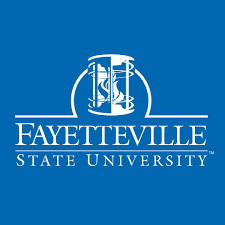HBCU Master’s Degree Program Phase II at Fayetteville State University
Year 1 Performance Highlights
Scholars Recruited
(COE, BCBE, CHST)
Persistence Rate
Contributions
Strategic Enrollment Growth
- College of Education (COE): 27 students in MAT/MEd STEM programs; 11 new Phase II scholars (8 MAT, 3 MEd)
- Broadwell College (BCBE): 173 MBA students across Healthcare Management, Health Informatics, Data Analytics, Digital Enterprise & Cloud Management, and Cyber Security; 15 new Phase II scholars
- Lloyd College (CHST): 21 MSN students in Patient Quality and Safety program; 5 new Phase II scholars
- Institutional Growth: Overall FSU enrollment increased from 6,223 (2016-17) to 6,847 (2023-24)
Student Success Outcomes
- Graduation Rate: 34.7% of Fall 2023 graduate students graduated by August 2024
- Retention & Persistence: 47.4% retained; 82.1% persisted in programs
- Professional Development: MAT students received licensure exam prep software and financial assistance for certification fees
- Career Readiness: VMock AI platform provided résumé feedback and job placement support across all programs
Infrastructure & Technological Innovation
Major Capital Investments: Bloomberg Terminals installed in BCBE Trading Room for real-time financial market analysis; Nursing Patient Safety Lab established with high-fidelity simulation equipment; Data Science Lab completed using Dell Bright Cluster Manager for high-performance computing; VMock AI-powered career platform deployed university-wide.
STEM Education Center: Groundbreaking ceremony held December 12, 2024, for new College of Education Building housing the STEM Education Center. Facility scheduled for completion Fall 2026 will serve as hub for instructional innovation, interdisciplinary research, and STEM educator preparation.
Academic Program Innovation
- Fully Online MAT Program: Launched to expand access for working professionals and career changers seeking teacher certification
- Teacher Residency Program: Partnership with local educational agencies provides clinical teaching experience in real classroom settings
- Data Science Certificate: Students conducting applied research with Fort Bragg military partners
- Curriculum Planning: BCBE initiated development of Fintech concentration (MBA); COE planning Instructional Technology concentration (MEd)
- MS in Data Science: Proposal in development, supported by existing Phase I courses
- Goal: Develop 10 new STEM graduate courses by 2029
Student & Faculty Engagement Events
Excellence in Teaching Conference (April 12-13, 2024): 187 educators participated, including 100+ FSU students, in 16 sessions on mental health and resilience. Keynote by 2023-24 Teacher of the Year Jahara Davis.
Student Research Symposium (May 1, 2024): 86 student presentations across multiple disciplines with 179 participants, providing platform for scholarly dissemination and interdisciplinary engagement.
BCBE MBA Research Forum (May 7, 2024): Business faculty supported student-led presentations on applied research in analytics, finance, and healthcare management.
Challenges & Strategic Responses
Year 1 encountered administrative delays due to new procurement policies requiring approval for purchases over $29,000, impacting lab equipment acquisition timelines. Scholarship disbursements began Spring 2024 rather than Fall 2023 due to enrollment scheduling. In response, FSU implemented structured workflows, realigned budget categories, and adjusted construction timelines. The university is now using persistence, graduation, and engagement data to evaluate long-term impact and guide sustainability decisions.
Institutionalization & Sustainability
FSU is integrating successful Phase II initiatives into long-term strategic plans and operating budgets. Bloomberg Terminals, Nursing Patient Safety Lab, and Data Science Lab are being embedded into academic operations. Student Research Symposium and Excellence in Teaching Conference gaining institutional support with colleges planning recurring budget allocations. The university’s data-informed approach ensures the most impactful elements become permanent features of graduate education, supporting students, faculty, and programs beyond the grant period (through 2029).
